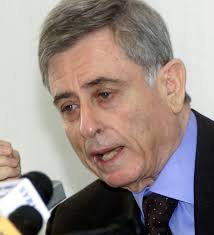A press statement by the Syrian Vice President, Abdel Halim Khaddam,
In which he warns of the danger of playing with the disintegration of Iraq, and affirms
That there are no secret negotiations between Syria and Israel.
On what basis does Syria demand the lifting of the embargo on Iraq?
□ The sanctions imposed on Iraq have caused significant harm to the Iraqi people, and the suffering that the Iraqi citizens endure is painful to us all as much as it is painful to them. We have always been talking, for years, about the necessity of finding ways to alleviate this suffering.
Naturally, we have said and continue to say that all United Nations Security Council resolutions must be implemented. Hence, a question arises: Have all the resolutions been implemented or not? This is a matter that has not been discussed, neither within the Arab context nor in the international context.
There is a point that draws attention, the attention of people, which is why Israel is not punished in the same way as Iraq is punished? Moreover, why does Israel enjoy protection from any resolution that might be issued by the Security Council against aggressive acts committed daily, whether in Palestine, the Golan Heights, or southern Lebanon?
We are not discussing a specific situation in our Arab policy, we are talking about a general Arab situation. This Arab situation had implications in the previous phase, and the continuation of this Arab situation will also lead to new harmful implications for the Arab situation. Therefore, it is necessary to discuss how to improve the Arab working atmosphere and establish new foundations that lead to efforts serving the higher interests of the Arab nation, with the foremost aim of preventing risks.
Does lifting the embargo strengthen President Saddam Hussein?
Our relationship with the Iraqi government is well-known, even before the Iraq-Iran war and before the Iraqi invasion of Kuwait. We don’t want to see matters through the lens of bilateral relations between this country or that, but within the broader Arab framework.
What is the next step after the visit of the Iraqi Deputy Prime Minister, Tariq Aziz, to Damascus?
The Iraqi Deputy Prime Minister requested a visit to Syria to brief us on the current situation and the ongoing crisis with the United States. He spoke about the stages of the work of the inspection committees, the facilitations provided by the Iraqi government, and how matters developed, including the Russian initiative. He emphasized that what is important to them is to have a light at the end of the tunnel. He stated that they have implemented everything required of them in the Security Council, and there was talk about the general Arab situation.
Does Turkey have ambitions in northern Iraq?
More than one international party has ambitions, in addition to some regional parties, in Iraq. Most Arab countries see the danger we see in the Turkish invasion of northern Iraq and attempts to create a state of internal division in Iraq. I believe that most Arab parties recognize the danger of playing with the national structure in Iraq.
Do you think there is no hope for advancing the peace process as long as Benjamin Netanyahu is the Israeli Prime Minister?
The Arab side has declared its commitment to the peace process, and if it weren’t for Syria’s acceptance of the American initiative, the Madrid Conference would not have taken place. So, the issue concerns the Israeli policy itself, a policy that presents concepts of peace conflicting with the reasons that led to the conflict. The conflict began over land, while they (the Israelis) want both land and peace.
Therefore, the matter is linked to changing the Israeli policy. When the Israeli government changes its policy and returns to the reference of the peace process, the Madrid reference, and accepts what the government of Yitzhak Rabin committed to, negotiations will resume quickly.
Have there been secret negotiations with the Israelis?
There are no secret contacts.
Not even in the presence of the Americans?
Not even in their presence.
Why has the American role receded?
For several reasons, firstly, not exerting pressure on the Netanyahu government. We have dealt with the American role very seriously, but what poses obstacles is the Israeli side. It was expected from Washington, due to its special relations with Israel, to exert pressures and measures to guide the Israeli government back on the right track. However, this didn’t happen because the Israeli government is obstinate, and this obstinacy doesn’t find a suitable response from Washington.
Do you believe that changing the American Ambassador in Damascus, Christopher Ross, is an additional indication of the receding American role?
No. Ross’s term has ended, and it was extended several times. He has been in the position for over six years.
What is the Syrian stance on Israeli withdrawal from southern Lebanon?
If Israel wants to withdraw from Arab land, shouldn’t that be welcomed? It entered, occupied, and should leave. But it wants to strike a deal with the Lebanese government to secure its safety. The Lebanese response, from the Prime Minister, was that the Lebanese cannot guarantee Israel’s safety, because if any problem arises in the future, they (the Israelis) will blame Lebanon and return to occupation, as happened in the 1982 invasion when Israel used an incident in Europe to enter Lebanon.
In any case, if the Israelis want to withdraw without conditions and implement Resolution 425, then Lebanon, Syria, and the rest of the Arab world welcome that. If they want to maneuver to gain advantages at the expense of Lebanon, the Lebanese state has an answer.

